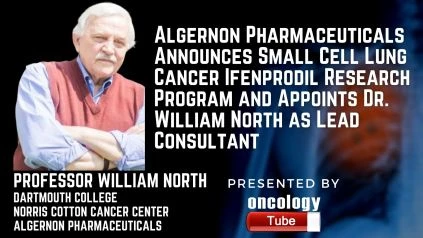Professor William North, Professor Emeritus of Physiology and Neurobiology at the Geisel School of Medicine at Dartmouth College and was a Senior Faculty member of the Norris Cotton Cancer Center, Lead Consultant at Algernon Pharmaceuticals speaks about Algernon Pharmaceuticals Announces Small Cell Lung Cancer Ifenprodil Research Program and Appoints Dr. William North as Lead Consultant.
Algernon Pharmaceuticals Inc., a clinical-stage pharmaceutical development company, is pleased to announce the launch of an NP-120 (“Ifenprodilâ€) small cell lung cancer (“SCLCâ€) research program and the appointment of Dr. William North, a cancer research pioneer and professor emeritus at Dartmouth College, as lead consultant. SCLC is a kind of high-grade neuroendocrine carcinoma that mostly affects current or past smokers and has a very bad prognosis. SCLC is responsible for around 15% of all lung cancer cases.
Ifenprodil in conjunction with the chemotherapeutic drug topotecan exhibited obvious additive effects that fully inhibited tumor development, according to research published in January 2019 titled “Small-Cell Lung Cancer Growth Inhibition: Synergism Between NMDA Receptor Blockade and Chemotherapy.”
The following are some of the study’s key findings:
When NCI H82 cells were incubated with Ifenprodil in vitro, critical components of the ERK 1/2 growth cascade were dramatically decreased. The ERK/MAPK signaling pathway is activated, which increases proliferation and inhibits apoptosis. In addition, levels of the DNA repair protein poly(ADP-ribose) polymerase (PARP) were decreased (X0.38), whereas cell death was enhanced (X5.21). NCI H82 has been labeled as a “variant” that represents a recurring illness.
Ifenprodil dosages of 50M decreased NCI H82 cell viability considerably (P0.01) after 48 hours of incubation, with an IC50 produced by doses of >106M. Furthermore, there were clear additive effects with topotecan, as co-incubation with 4M, topotecan lowered Ifenprodil’s IC50 from 106 to 7.3 M (P0.0001).
Xenografts from mice given a daily dosage of Ifenprodil (2.5 mg/kg) for 10 days shrank by 30% and remained at a size lower than on day 0 until treatment was stopped on day 10. Tumors continued to heal and develop again after then, albeit at the same pace as control tumors (P0.001). The dosage of 2.5 mg/kg was well tolerated by the animals and had no negative effects on their health.
Xenografts from mice given alternate day doses of Ifenprodil (2.5 mg/kg) or topotecan (days 0, 2, and 4) for 9 days showed slowed tumor growth compared to vehicle-treated controls, with each agent limiting tumor growth to about 2.5 times by day 16, whereas controls increased to an average of 9.2-times. Tumor doubling times were 4 days in the control group, 9 days in the topotecan group, and 12 days in the Ifenprodil group.
Xenografts from mice given Ifenprodil (2.5 mg/kg) + 3 mg/kg topotecan on days 0, 2, and 4 seemed to stop all development during the 16-day observation period, and the tumors of all individual animals behaved similarly with little scatter. The combination of topotecan and Ifenprodil showed obvious addition (P0.01) and substantial synergy for smaller tumors (P=4.7E4) in this research.
On days 0, 1, and 2, xenografts from mice given alternate day doses of Ifenprodil (2.5 mg/kg) and 50 mg/kg cyclophosphamide exhibited a clear additive effect (P0.03), inhibiting tumor development.
Small Cell Study is the name of the research project.
The Company recently announced that it has entered into an exclusive license arrangement with Dartmouth College to obtain the rights to a method of use patent for treating neuroendocrine tumors with functioning N-methyl-D-aspartate (“NMDA”) receptors.
The Company intends to request a pre-IND (Investigational New Drug) meeting with the US Food and Drug Administration in order to explain all aspects of its SCLC cancer trial program design and get guidance and assistance from the agency. Following the recent announcement of the initiation of its pancreatic cancer research program, this will be the Company’s second cancer-related effort.

